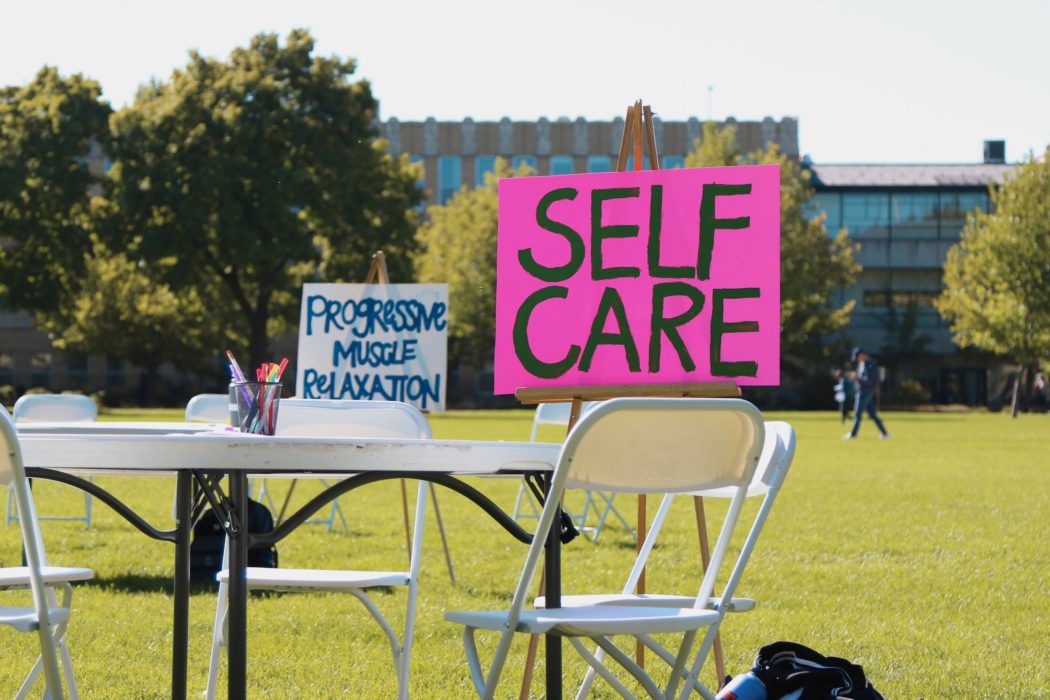Aggies stress, less
Stress affects students mentally, physically and emotionally, causing our grades to drop or causing tension in our relationships. It’s hard to push away when it overwhelms you in the middle of class or in the middle of a test.
“Stress is something that everyone experiences, it’s just a part of going through life,” said Heidi Bennett, a student who was chosen to be a part of the REACH Peers Program. “But just because it’s a part of life, doesn’t mean we have to struggle through it.”
The REACH Peers put together an activity called Stress Less on the Quad, where they set up a bunch of tables to address different solutions to minimizing stress. They covered things such as visualization, belly breathing, test anxiety, mindfulness and many more.
“It’s a very relaxed way of introducing the ideas that we share in our individual sessions that we have with students,” said Kiera Blackford, also a member of the REACH Peers Program. “It gives people a taste of what we do, so if people are interested they can come and see us and do more of these kinds of things with us.”
REACH stands for Resourcing, Educating, Accepting, Coaching and Helping. Each Spring they have applications for the program to take eight to ten students and train them in all of these aspects.
“REACH Peer serves a dual purpose,” said Monique Frazier, a staff psychologist on campus and a coordinator for the REACH Peer Program. “Primarily it’s to help students maximize their mental health one on one skills training, but it’s other purpose is to allow students who want to pursue a career in a helping field a chance to get a taste for it.”
These students and coordinators put on many activities throughout the year to help students learn skills to increase their mental health without the commitment of meeting with someone regularly. They go through a lot of training as a group, but also one on one with a coordinator, to make sure they are prepared to help other students throughout the year.
“Sometimes it’s nice to have someone to talk to who is going through similar things as you are,” Bennett said. “I like that there’s ten of us so we all are different and have different strengths and experiences.”
Each REACH Peer took a topic to help with stress and set up a table for students to come and learn how to manage their stress through their specific topic. They did demonstrations and small practices for each skill, and then you received a fun little prize afterward.
Many of the students agreed that the overall atmosphere was warm and welcoming, as they were able to learn some new skills to help with stress.
“The goal is to create a space for students to come and add to their mental health skills toolbox,” Frazier said. “We have been seeing since COVID even a little before COVID, a decrease in mental health in students. It’s not just true of college students either, we’ve all been struggling with mental health the past couple of years. I’m a big fan of preventative mental health; meaning instead of waiting for things to get really bad, you learn ways to prevent that from happening in the first place.”
One of the tables that many students were drawn to was mindfulness. Mindfulness is like yoga for your brain; it’s learning how to be present and be aware of your surroundings. Doing exercises such as listing five things you can see, four things you and hear, three things you can touch, two things you can smell and one thing you can taste.
Participating in that activity, students commented how they felt more relaxed and could feel a small weight lift from their shoulders. This, and many other ideas that the REACH Peer’s have can be helpful in diminishing stress before it explodes.
For more information on how you can learn preventative mental health strategies, contact the REACH Peer’s through www.usu.edu/aggiewellness.

